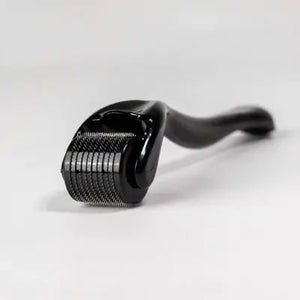
Stress-related hair loss - How do I get it under control?
Hair loss can have many causes. Stress-related hair loss is just one of them. Not only physical health plays a role in good hair growth; psychological health is also a crucial factor . But what can you do if your hair is falling out due to stress? When we're stressed, our bodies release chemical messengers that alert the body. This is a relic from ancient times, when, for example, our ancestors encountered a saber-toothed tiger. Many people today are under constant stress. This is anything but healthy – including for our hair. The unpleasant consequence is stress-related hair loss. The hair roots are surrounded by a sheath filled with nerves – the hair follicle. Constant stress can damage the hair follicles to the point where they begin to become inflamed. The culprits here are the neurotransmitters noradrenaline, substance P, and NGF. Their constant, increased release shortens the hair growth phase, causing premature hair loss. Furthermore, the hair no longer regenerates as quickly. The lost hair either stops growing or grows back only sparsely. Too much stress can also exacerbate existing hair loss .
When we're stressed, our bodies release chemical messengers that alert the body. This is a relic from ancient times, when, for example, our ancestors encountered a saber-toothed tiger. Many people today are under constant stress. This is anything but healthy – including for our hair. The unpleasant consequence is stress-related hair loss. The hair roots are surrounded by a sheath filled with nerves – the hair follicle. Constant stress can damage the hair follicles to the point where they begin to become inflamed. The culprits here are the neurotransmitters noradrenaline, substance P, and NGF. Their constant, increased release shortens the hair growth phase, causing premature hair loss. Furthermore, the hair no longer regenerates as quickly. The lost hair either stops growing or grows back only sparsely. Too much stress can also exacerbate existing hair loss .
Stress-related hair loss is a common cause
Hair loss can have a variety of causes. One factor that frequently comes into play in today's performance-oriented society when it comes to hair loss is stress. Unhealthy, long-term stress in particular can have a huge impact on our well-being and health – which is essential for healthy hair growth . This is how stress-related hair loss occurs. Hair is a part of our body and not just "dead tissue" as some might think. This makes it just as susceptible to stress as, say, our stomach. The same applies to our scalp, by the way. Our lifestyle can have a significant impact on hair growth, both positive and negative.When stress affects your hair
People who are constantly stressed are under constant, intense tension. The common result: stress-related hair loss. You're constantly on edge – and suddenly, in the morning, your hair ends up in clumps in the sink. In contrast to hereditary hair loss, where hair loss usually begins at the receding hairline, in this case the hair falls out all over the head. Doctors refer to this as effluvium , or diffuse hair loss . Once the stress is gone, the hair usually grows back miraculously.Stress and the hair follicles
 When we're stressed, our bodies release chemical messengers that alert the body. This is a relic from ancient times, when, for example, our ancestors encountered a saber-toothed tiger. Many people today are under constant stress. This is anything but healthy – including for our hair. The unpleasant consequence is stress-related hair loss. The hair roots are surrounded by a sheath filled with nerves – the hair follicle. Constant stress can damage the hair follicles to the point where they begin to become inflamed. The culprits here are the neurotransmitters noradrenaline, substance P, and NGF. Their constant, increased release shortens the hair growth phase, causing premature hair loss. Furthermore, the hair no longer regenerates as quickly. The lost hair either stops growing or grows back only sparsely. Too much stress can also exacerbate existing hair loss .
When we're stressed, our bodies release chemical messengers that alert the body. This is a relic from ancient times, when, for example, our ancestors encountered a saber-toothed tiger. Many people today are under constant stress. This is anything but healthy – including for our hair. The unpleasant consequence is stress-related hair loss. The hair roots are surrounded by a sheath filled with nerves – the hair follicle. Constant stress can damage the hair follicles to the point where they begin to become inflamed. The culprits here are the neurotransmitters noradrenaline, substance P, and NGF. Their constant, increased release shortens the hair growth phase, causing premature hair loss. Furthermore, the hair no longer regenerates as quickly. The lost hair either stops growing or grows back only sparsely. Too much stress can also exacerbate existing hair loss .


















